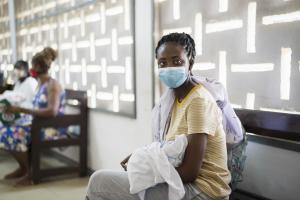Reinforcing key health services amid COVID-19
Accra – Thousands of vaccinators fanned through villages and towns across 73 districts in Ghana, immunizing more than 4.6 million children against vaccine-derived poliovirus. Mass immunization campaigns, like many key health services, have suffered a heavy jolt dealt by the COVID-19 pandemic.
Health authorities in Ghana are now reviving and reinforcing essential services to not only better withstand disruption in case of a new COVID-19 wave but also improve quality. The latest rounds of polio vaccinations carried out in October had had been scheduled for April and May but were shelved in the face of rising COVID-19 cases that overstretched the health system, prompted movement restrictions as well as a ban on mass gatherings.
To safely resume the mass immunization drive, vaccinators were trained on COVID-19 prevention, provided with personal protective equipment and hand sanitizers. Meanwhile, measures to limit COVID-19 transmission are also being implemented in hospitals and health centres as key services are bolstered. In health facilities, pre-triaging spaces have been set up to screen patients before being allowed to seek consultation in a bid to mitigate risks of exposing the patients and health workers to the virus.
Investments have also been made to improve health worker knowledge and skills, and to bolster the health infrastructure. The supply of essential medical materials, including through local manufacturing, is also being enhanced.
Dr Anthony Adofo Ofosu, the Deputy Director General at Ghana Health Service in charge of essential health services, says that in addition to the investments, the lessons learnt during the polio vaccination campaign and the measures being taken to minimize COVID-19 infections as people seek treatment are strengthening the provision of essential services amid the pandemic.
“We have learnt a lot in this period on how to provide these services while protecting both our health workers and the public from COVID-19 infection,” he says. “We have been quite successful in reviving our essential services.”
Other mass public health campaigns are also getting underway. Distribution of bed nets, as the malaria season kicks in, as well medicines for neglected tropical diseases are ongoing. Yellow fever mass vaccination is also set to restart. “Things are getting back on track. We have gone back do doing mass campaigns,” says Dr Ofosu.
The impact of the COVID-19 pandemic on key health services has been widespread in Africa. Immunization campaigns of measles, tuberculosis, yellow fever, polio and other diseases have been postponed in at least 15 African countries this year.
Collaborating with World Health Organization (WHO) and other partners, Ghana has over the last three months worked to steer essential health services back on track. Adapting WHO guidance, the country has developed a national plan for the maintenance of essential health services and identified key services that must be provided during the pandemic.
These services include prevention and treatment of communicable diseases, including immunizations, health services for vulnerable populations such as infants and older people, critical care at facilities, emergency as well as auxiliary services such as basic diagnostic imaging, laboratory and blood bank.
The recent mass polio vaccination has brought relief to parents who kept away from health facilities fearing that they could contract COVID-19. “It is good they are coming around to provide the services we are unable to go to the clinics for,” says Aboagywaa Osei, whose five-month-old baby was immunized. “But we have been told that health facilities are safe, so we are confident to take our children to receive all the essential services.”
With the efforts to restore essential services beginning to pay off, Dr Ofosu of the Ghana Health Service says that “the country is in a better position to ensure the continuity of these essential services should there be a second wave in COVID -19 infections.”



